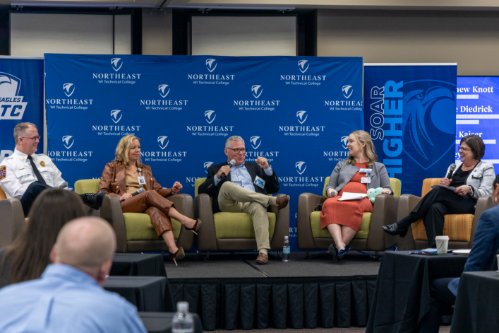Today, the Aspen Institute named NWTC as a finalist for the 2025 Aspen Prize for Community College Excellence. The $1 million award is the nation's signature recognition of strong performance among community colleges. The institutions selected for this honor stand out among more than 1,000 community colleges nationwide as having high and improving levels of student success, as well as equitable outcomes for Black and Hispanic students and those from lower-income backgrounds.
“To be named a finalist for the Aspen Prize is such an incredible honor,” said Kristen Raney, NWTC president. “It recognizes NWTC’s deep commitment to equitable student outcomes that transforms lives and strengthens our communities. This is a reflection of the transformative work we do every day and should be celebrated by all who call Northeast Wisconsin home. We are very excited to continue next steps of the Aspen Prize process and for the bright future of our college and community.”
Over the last decade, NWTC has expended substantial resources into understanding how to better meet the unique needs of individual students so that they can thrive as learners. Benefitting from a culture of comprehensive support, NWTC students consistently achieve better educational outcomes than similar institutions nationwide.
While many students exit college before completing the required coursework, NWTC’s graduation rates are double compared to the national average. Additionally, the percentage of NWTC students persisting from first to second year – a critical period in which many do not complete – has consistently increased over time and is above that of comparison to other institutions. The most dramatic increases have been observed within historically underserved populations, including lower income and student of color.
Awarded every two years, the Aspen Prize honors colleges with outstanding performance in six critical areas: teaching and learning, certificate and degree completion, transfer and bachelor’s attainment, workforce success, broad access to the college and its offerings, and equitable outcomes for students of color and students from low-income backgrounds. The winner will be announced in the spring of 2025.
Josh Wyner, executive director of the Aspen Institute College Excellence Program, noted the Aspen Prize finalists not only deserve national recognition, but they also need to be studied and their successes replicated.
“Working-class Americans are experiencing an economy that seems to be stacked against them, while employers are struggling to find well-prepared workers in fields such as teaching, nursing, software development, welding, and advanced manufacturing,” Wyner said. “The 10 Aspen Prize finalists demonstrate how community colleges serving urban and rural communities throughout the country can prepare many more graduates for fulfilling lives and careers in their communities. They show that excellence can be reached in any and every context.”
The finalist are:
- Georgia Highlands College, GA
- Moorpark College, CA
- Northeast Wisconsin Technical College, WI
- Northwest Vista College, TX
- San Jacinto College, TX
- Seminole State College of Florida
- South Puget Sound Community College, WA
- Southwest Wisconsin Technical College, WI
- Union College of Union County, NJ
- Wallace State Community College-Hanceville, AL
The Aspen Prize selection process began in the summer of 2023 when Aspen analyzed data on 1,000 community colleges in key areas such as retention, completion, and transfer. In October, Aspen invited 150 community colleges to apply based on data showing high, improving, and equitable levels of student success. The 118 submitted applications went to a selection committee of 18 higher education experts who assessed each application based on extensive data and narrative answers to questions. Following interviews with leadership teams from applicants receiving top scores, 20 semifinalists were selected and announced in May. The committee continued its review and narrowed the field to the 10 finalists.
Next steps in the process include:
- Fall 2024: Multi-day in-person site visits to each of the 10 finalists, during which Aspen and partners will collect additional information, and additional data collection, including extensive employment and earnings data on graduates from the finalist colleges.
- Winter 2025: A distinguished, independent Prize jury will review data and qualitative summaries that synthesize each part of the 14-month analyses, then meet for a full day to select the winner and others for additional recognition.
- April 17, 2025: Announcement of the Aspen Prize winner and celebration of the 10 finalists in Washington, DC
To read more on the selection process, visit
https://highered.aspeninstitute.org/aspen-prize/
###
The Aspen Prize is generously funded by Ascendium, the Joyce Foundation, JPMorgan Chase, and the Kresge Foundation. Previous winners are:
- 2023: Amarillo College (TX) and Imperial Valley College (CA)
- 2021: San Antonio College (TX)
- 2019: Indian River State College (FL) and Miami Dade College (FL)
- 2017: Lake Area Technical Institute (SD)
- 2015: Santa Fe College (FL)
- 2013: Santa Barbara City College (CA) and Walla Walla Community College (WA)
- 2011: Valencia College (FL)
Note: Colleges that have won the Aspen Prize are not eligible to apply in subsequent years
The Aspen Institute College Excellence Program supports colleges and universities in their quest to achieve a higher standard of excellence, delivering credentials that unlock life-changing careers and strengthen our economy, society, and democracy. We know it takes visionary college leaders to lead scaled, sustainable reforms, and we make it our mission to equip them with the knowledge, skills, and research-backed tools to inspire change, shift practice, and advance the capacity of colleges to deliver excellent and equitable student outcomes. For more information, visit our website and follow us on LinkedIn and X.
The Aspen Institute is a global nonprofit organization whose purpose is to ignite human potential to build understanding and create new possibilities for a better world. Founded in 1949, the Institute drives change through dialogue, leadership, and action to help solve society’s greatest challenges. It is headquartered in Washington, DC and has a campus in Aspen, Colorado, as well as an international network of partners. For more information, visit www.aspeninstitute.org.



